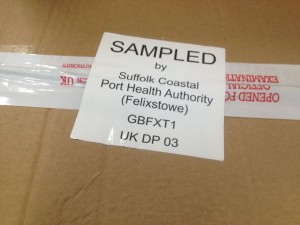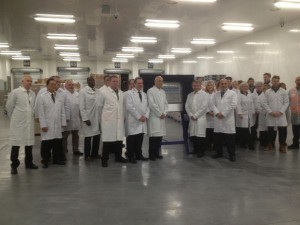Archives
Feature, Freight News, Sea
Felixstowe food exam facilities make the grade
[ October 30, 2015 // Chris ]Transport Minister, Robert Goodwill, formally opened the Port of Felixstowe’s new ambient temperature food examination facility on 29 October.
The £4 million investment includes a major refurbishment and expansion of the examination facilities and the provision of new offices for Suffolk Coastal Port Health Authority. It also brings the port’s facilities into line with new EU legislation requiring Border Inspection Posts and Designated Points of Entry to be combined into single Border Control Points (BCPs). This introduces more flexibility into the examination process, and allows all staff involved in food examination to be concentrated in one area, but facilities have to be of a high standard and closely controlled to eliminate the possibility of cross-contamination. New hand-held computers have also helped speed up inspections.
Some £3.7m of the investment has gone into new facilities for non-animal products including a dedicated allergens area, general food areas and an area for micro-analysis.
The new facility covers over 3,000sq metres plus 840sq m of office space and meeting rooms for port and Port Health staff. Separate examination chambers, including segregated areas for dusty products such as chilli, spices and other powders, allow multiple consignments to be examined without the risk of contamination. The facilities are also divided into colour-coded sections for nut- and non nut-containing products – red for equipment and clothing in the nut area and white in the non-nut section.

The nearest comparable inspection facilities are at London Gateway, about 50 miles to the south, though inspectors from Felixstowe will visit ports in the area as required.
Commenting on the new facility, Robert Goodwill, a farmer himself pointed out that 40% of the food on UK supermarket shelves arrives by sea, so it must be checked efficiently in the most hygienic conditions. He described the facilities as “the first line of defence” against food that may not have been produced to the same exacting standards as British farmers. “We’re keeping up our guard to prevent dodgy products into the country.”
On the day of the official visit, inspectors were scrutinising a pallet-load of fluorescent orange fizzy drink from south-east Asia, and were also testing dried figs for contaminants such as aflatoxins. The increasing variety of imported ‘ethnic’ foodstuffs has increased the workload on inspection services, but Felixstowe expects to maintain a 24-hour turnaround time for most inspections.

Tags: felixstowe











